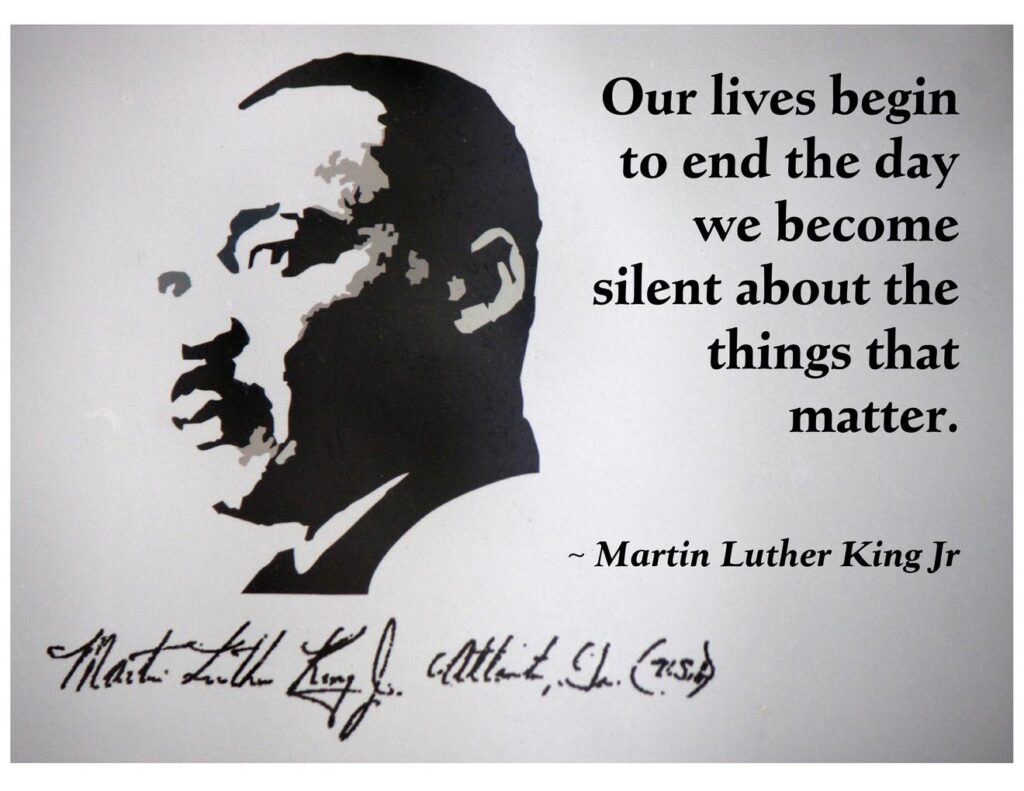By Michael Shook
It is February, Black History Month. I think January and February dovetail nicely, since last month we celebrated the birthday of one of the great leaders of the twentieth century, the Reverend Dr. Martin Luther King, Jr. And as I’ve considered the history of recent years, and the legacy of Dr. King, I have wondered if many of us aren’t missing rather badly what the good Reverend was trying to communicate.
Last month, during the commemoration of King’s birthday, our Episcopal Bishop sent out a message, wherein she spoke – mostly using King’s words – of five core principles that King espoused for effective social change via the practice of nonviolence. They were:
1) Nonviolence means neither cowardice nor passivity.
2) The goal is not to defeat anyone, but to create friendship and understanding. The end goal is redemption and reconciliation.
3) Nonviolence attacks evil, not the evildoer. It seeks to defeat injustice, not the persons who may be unjust.
4) The nonviolent actor is willing to accept violence if necessary, but never to inflict it.
5) Love is central. The nonviolent resister refuses to hate the opponent.
If we take King seriously, then we must ask ourselves to what degree we are, or have been, acting in accord with the precepts he laid out. It is easy to pay lip service to his legacy, to attend rallies once a year and to read yet another piece in the opinion pages about the “brave sacrifice and bold vision” that King bequeathed us all. But perhaps we ought to pause as we celebrate Black History Month and ask ourselves whether or not we are doing what we were called by his words to actually do.
Specifically, how are we conducting ourselves in our daily lives, in our interactions with our fellow human beings? Are we doing anything to build relationships, “to create friendship and understanding?” Are we practicing nonviolence? I wonder.
How often I have heard my family members, or friends, or acquaintances – intelligent, thoughtful, and progressive people, one and all – utter words of violent content, damning and condemning those they disagree with, their words dripping with contempt for the “troglodytes,” the “brain-dead” who are too dumb to know when they are voting against their own best interests; the “deplorables” that populate (in their minds) so much of the nation.
Indeed, too often I’ve been guilty of the same. Of course, some folks on the other side of the political divide say much the same about those they disagree with, but that is no excuse. All of it is the way of violence.
When I would indulge myself thusly, a good friend used to quote to me from Proverbs; “As a man thinketh, so shall he be.” Over the years, I found myself considering the words that too often sprang from my thoughts, and – because words are a form of action – what I was doing. I realized I was making myself angry, cynical, and bitter. I saw what a pointless exercise it was to so denigrate my fellow citizens. My ranting was poisoning my life, but no good change was effected, and it crippled any chance for sincere communication by destroying the possibility of establishing a relationship with those I disagreed with. And relationship is central to communication.
Carefully crafted studies, as well as everyday observations, have made it clear that before anyone will entertain a new perspective on a given issue, there has to be a relationship with the interlocutor. There has to be some element of trust. There has to be genuine listening. Absent that, one or both parties simply retreat to their respective barricades, and shout ever more loudly.
King’s message is, I think, more important than ever. Consider again his precepts. What would our discourse be like if we stopped demonizing others long enough to listen to them, to take their concerns seriously? To let them know that they’ve been heard, and not summarily dismissed?
Agreeing with the other is not the point, and paradoxically, we needn’t even like someone to act in this way. In the context of nonviolence, Dr. King dismissed the idea of liking someone: “Like is sentimental and it is pretty difficult to like someone bombing your home; it is pretty difficult to like someone threatening your children … But Jesus says love them, and love is stronger than like.”
Love is the foundation of all life. It is the only force that can counter and transform the darkness that lies within all our hearts. Only love can generate the courage necessary to stop hating, to listen to others, to build a relationship from which understanding, goodness, mercy, and compassion flow. This is the way to create trust, and friendship, and build the “blessed community.”
When we use ugly, derogatory epithets to speak about those we disagree with – no matter how righteous our indignation – we are building walls of hate to lurk behind. We are creating the “other.” How are we to ever cross bridges to build a future for all when we are so busy verbally firebombing each other? What does it say about those who call themselves progressive and/or liberal, who regard themselves as better-informed, more intelligent, and more sophisticated than the “hoi polloi,” yet who nevertheless smugly slander those on a different part of the political spectrum? What does it say about how earnestly they are applying the teachings of Dr. King to their own lives?
This year, I am resolved to practice more diligently Dr. King’s precepts of nonviolence. I will especially bear in mind that, “The goal is not to defeat anyone, but to create friendship, and understanding. The end goal is redemption and reconciliation.” That seems to me a most worthy, if challenging, resolution. And I think the part about “redemption and reconciliation” applies to us all.

